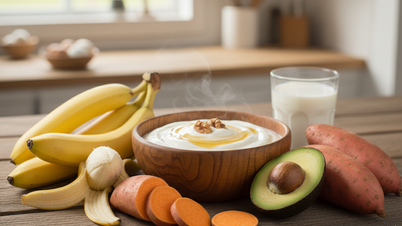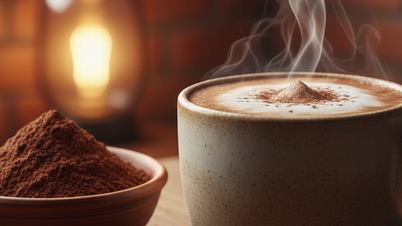However, to get maximum health benefits, a nutritionist advises knowing how to eat bananas properly, according to the Indian Express .
Here, nutritionist Garima Goyal from India shares some tips on eating bananas to maximize their benefits.

Bananas, packed with nutrients, rich in natural sugars, potassium and fiber, are a great way to boost energy.
Photo: AI
Don't eat bananas on an empty stomach
Nutritionist Garima Goyal explains: Eating bananas on an empty stomach can cause some side effects such as:
Blood sugar fluctuations . Eating bananas on an empty stomach can cause your blood sugar to spike, then drop suddenly, leaving you feeling sluggish and hungry soon after.
Acid-base imbalance . Bananas can increase acidity on an empty stomach. This can cause problems for people prone to acid reflux, gastritis, or digestive sensitivities.
Interfere with nutrient absorption . Bananas are rich in magnesium and potassium, minerals essential for muscle and nerve function. However, eating bananas alone in the morning can cause a sudden increase in these minerals in the blood, which can lead to an imbalance – especially in people with kidney problems.
May cause digestive upset . In some people, eating bananas on an empty stomach can cause bloating, nausea, or stomach upset due to their high fiber content. This is especially true with unripe bananas, as they contain more resistant starch, which takes longer to digest.
Nutritionist Garima Goyal advises: If you like to eat bananas in the morning, combine them with protein or healthy fats such as nuts, yogurt or oats for a balanced, nutritious meal. Avoid mixing bananas with milk or cream, as they are not good for digestion or blood sugar levels.

If you like to eat bananas in the morning, combine them with protein or healthy fats like nuts, yogurt or oatmeal.
Photo: AI
Choose the right type of banana
Depending on your health condition, choosing the right type of banana is very important:
Ripe bananas (yellow with brown spots): Easier to digest, sweeter and contain more antioxidants but can cause blood sugar levels to rise more quickly.
Unripe (yellow-green) bananas : Contains more resistant starch, which slows digestion and provides longer-lasting energy. Better for diabetics but may be harder to digest for some people.
People with diabetes or insulin resistance should choose unripe or semi-ripe bananas, as they release sugar more slowly.
You should not eat more than one fruit at a time.
Ms. Goyal asserts that while it may be tempting to eat two or more bananas at a time, it should be done in moderation. For the following reasons:
Excess sugar . One medium banana contains about 14 grams of sugar. Eating more than one can lead to excess sugar, which is not good, especially for people who are insulin sensitive.
High potassium levels (risk of hyperkalemia). Although rare, consuming too many bananas can lead to high blood potassium levels, which can potentially affect heart and kidney function.
Bloating and digestive issues . Bananas are rich in fiber and prebiotics. While they are great for gut health, eating too many at once can cause gas or bloating, says Goyal.
For most people, eating one banana at a time is enough. Active people or athletes can eat more, but remember to balance it with other foods, according to the Indian Express .
Source: https://thanhnien.vn/chuyen-gia-chi-meo-an-chuoi-tot-nhat-cho-suc-khoe-18525072222562884.htm


![[Photo] General Secretary To Lam receives Singaporean Ambassador Jaya Ratnam](https://vphoto.vietnam.vn/thumb/1200x675/vietnam/resource/IMAGE/2025/11/03/1762171461424_a1-bnd-5309-9100-jpg.webp)
![[Photo] Fall Fair 2025 and impressive records](https://vphoto.vietnam.vn/thumb/1200x675/vietnam/resource/IMAGE/2025/11/03/1762180761230_ndo_br_tk-hcmt-15-jpg.webp)

![[Photo] Prime Minister Pham Minh Chinh receives the Chairman of the Japan-Vietnam Friendship Association in the Kansai region](https://vphoto.vietnam.vn/thumb/1200x675/vietnam/resource/IMAGE/2025/11/03/1762176259003_ndo_br_dsc-9224-jpg.webp)

![[Photo] Lam Dong: Close-up of illegal lake with broken wall](https://vphoto.vietnam.vn/thumb/1200x675/vietnam/resource/IMAGE/2025/11/03/1762166057849_a5018a8dcbd5478b1ec4-jpg.webp)







































































































Comment (0)